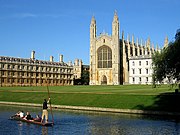| Главная » Статьи » Английский язык » Тематические тексты |
Education

King's College, part of the University of Cambridge 
Christ Church, part of the University of Oxford Education in the United Kingdom is a devolved matter with England, Northern Ireland, Scotland and Wales having separate systems. Education in England is the responsibility of the Secretary of State for Children, Schools and Families and the Secretary of State for Innovation, Universities and Skills, though the day to day administration and funding of state schools is the responsibility of Local Education Authorities. Universal state education in England and Wales was introduced for primary level in 1870 and secondary level in 1900.[172] Education is mandatory from ages five to sixteen (15 if born in late July or August). The majority of children are educated in state-sector schools, only a small proportion of which select on the grounds of academic ability. Despite a fall in actual numbers, the proportion of children in England attending private schools has risen to over 7%.[173] Just over half of students at the leading universities of Cambridge and Oxford had attended state schools.[174] State schools which are allowed to select pupils according to intelligence and academic ability can achieve comparable results to the most selective private schools: out of the top ten performing schools in terms of GCSE results in 2006 two were state-run grammar schools. England has some of the top universities in the world; University of Cambridge, University of Oxford, and University of London are ranked among the top 20 in the 2007 THES - QS World University Rankings.[175] There are fears, however, that a decline in the number of English students studying a foreign language will have a negative effect on business, which has led to calls for languages to be given greater priority.[176] Education in Scotland is the responsibility of the Cabinet Secretary for Education and Lifelong Learning, with day to day administration and funding of state schools the responsibility of Local Authorities. Two non-departmental public bodies have key roles in Scottish education: the Scottish Qualifications Authority is responsible for the development, accreditation, assessment and certification of qualifications other than degrees which are delivered at secondary schools, post-secondary colleges of further education and other centres;[177] and Learning and Teaching Scotland provides advice, resources and staff development to the education community to promote curriculum development and create a culture of innovation, ambition and excellence.[178] Scotland first legislated for compulsory education in 1496.[179] The proportion of children in Scotland attending private schools is just over 4%, although it has been rising slowly in recent years.[180] Scottish students who attend Scottish universities pay neither tuition fees nor graduate endowment charges as the fees were abolished in 2001 and the graduate endowment scheme was abolished in 2008.[181] Education in Northern Ireland is the responsibility of the Minister for Education, currently Caitríona Ruane (Sinn Féin),[48] although responsibility at a local level is administered by five Education and Library Boards, covering different geographical areas. The 'Council for the Curriculum, Examinations & Assessment (CCEA) is the body responsible for advising the government on what should be taught in Northern Ireland's schools, monitoring standards and awarding qualifications.[182] The National Assembly for Wales has responsibility for education in Wales. A significant number of Welsh students are taught either wholly or largely in the Welsh language; lessons in Welsh are compulsory for all until the age of 16. There are plans to increase the provision of Welsh Medium schools as part of the policy of having a fully bi-lingual Wales. The Programme for International Student Assessment ranked the UK 14th in science, which was higher than the OECD average.[183] Источник: http://wikipedia.org | |
| Просмотров: 972 | |
| Всего комментариев: 0 | |